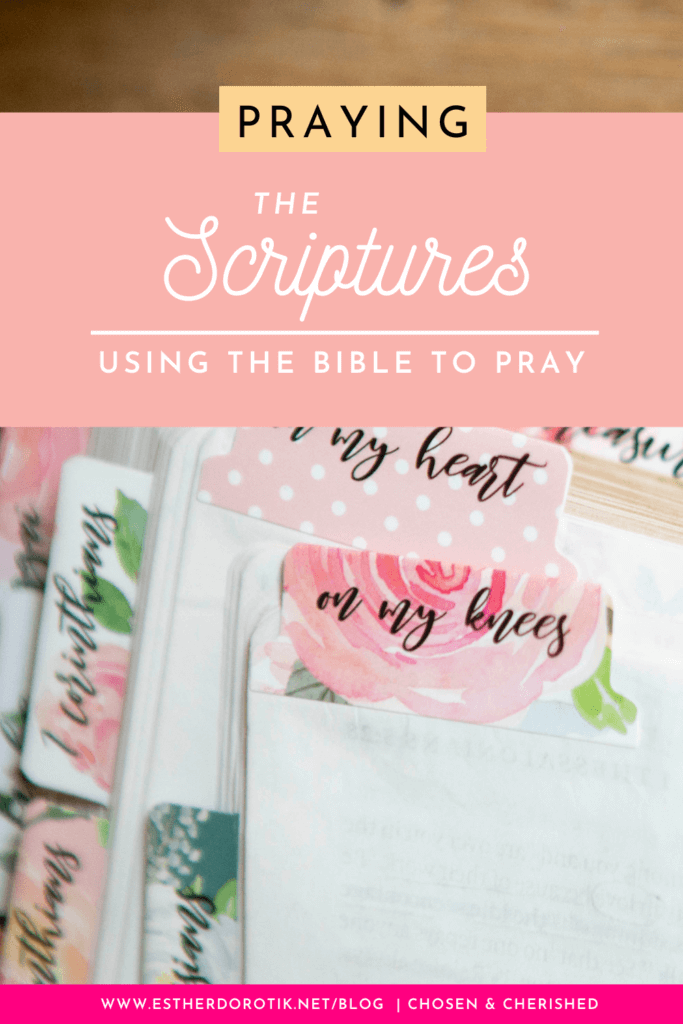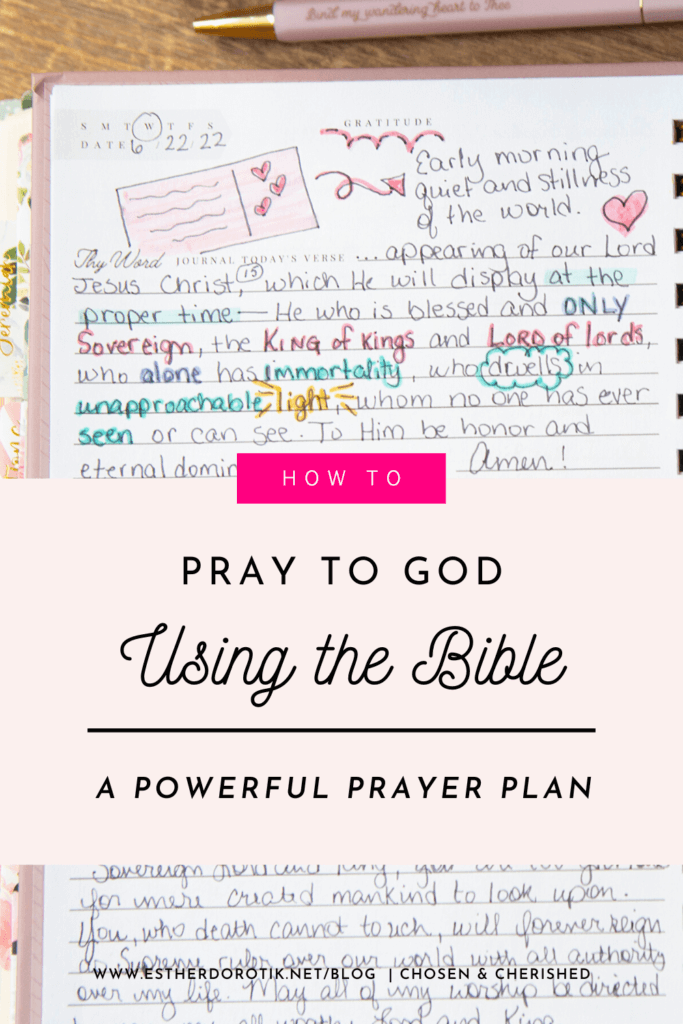Prayer, while considered a fundamental practice in Christian life, can often become a source of confusion and frustration for many believers. At its core, prayer is a form of intimate communication with God intended to deepen one’s relationship with Him. However, the struggle often arises in knowing how to pray to God, what to say, and how to listen. This challenge is compounded by the busy nature of modern life, where finding quiet, uninterrupted moments for reflection and connection can seem nearly impossible. Yet, in these moments of sincere outreach and vulnerability, prayer finds its true power, offering guidance, solace, and a profound sense of peace.
One of the best ways to develop your prayer life is by praying the scriptures. This practice involves using words and phrases from the bible in your prayers, allowing God’s Word to guide and shape your communication with Him by supplying the very words, wisdom, promises, praise, and pleas. This guide is designed to help you learn how to weave scripture into your conversations with God, eliminating the “what to say” struggle. Let’s explore the importance of selecting, meditating on, and integrating scripture into your prayers.
Why Praying the Scriptures is Important?
The Bible is God’s word; as such, it contains timeless truths and precious promises that can bring comfort, guidance, and inspiration to our prayers. Praying the bible also helps us align our thoughts and desires with God’s will and reminds us of His faithfulness and love. By incorporating scripture into our prayers, we acknowledge God’s authority and lean on His all-surpassing wisdom. Additionally, praying with scripture can help us to focus and quiet our minds, making it easier to hear from God.
Related: Learn How To Pray With These Powerful Keys | 80 Bible Verses On Prayer
Related: A free bible study on being still before God. How to Be Still and Pray
Context Is Key When Praying the Bible
A foundational principle of biblical interpretation, also pertinent in the art of prayer, is context. This means understanding the historical context of a verse, the author’s intent, and the bible’s broader teachings. Misuse or misinterpretation of scripture can lead to a skewed understanding. Therefore, as you incorporate scripture in your prayers, keep each verse within its intended context. We can’t make the verse mean something today that it didn’t mean when it was originally written.
For step-by-step guidance on How to Study the Bible, including context, be sure to check out this post: The Ultimate 12-Step Guide to Studying the Bible
Step 1: Selecting Relevant Verses for Praying the Scriptures
Selecting the right scriptures to include in your prayers does not have to be a daunting task. Start by identifying passages that resonate with your current life situations or those that offer comfort and guidance. Psalms, for example, contain a wealth of expressive sentiments that can be used to praise and seek solace. Proverbs, on the other hand, is replete with wisdom that can be sought during decision-making. If you need encouragement, the epistles of Paul are filled with uplifting messages. A daily devotional or Bible reading plan can help you encounter scriptures that might speak to you in different seasons of your life. Epistles often contain prayers and blessings that can be adapted to our own. You can also use a concordance or a Bible app to find scriptures related to specific topics, such as hope, patience, or thanksgiving. Take the time to contemplate the passages you come across and choose those that stir your heart and align with the purpose of your prayer. Intentionally choosing passages creates a more personalized and impactful prayer experience. Here are a few suggestions on how to select verses for praying the scriptures:
- Reflect on Your Needs: It’s essential that the chosen scriptures align with what you are asking of God. For example, if you’re praying for healing, you could turn to James 5:15, “The prayer offered in faith will make the sick person well.” However, remember that healing can come in many forms, including spiritual and emotional, so ensure the verse speaks to the full depth of your intent.
- Connecting with Biblical Figures and Events: When we pray with passages recounting the experiences of Biblical characters, we can find parallels in our own lives and receive timeless wisdom and encouragement. As we invoke these stories during prayer, we are reminded that we are part of a larger narrative and can draw strength from their scripture examples of faith, perseverance, and interaction. One example is when we contemplate the life of David, a man after God’s own heart. We can draw inspiration from his struggles and victories and his raw emotions expressed in the Psalms. His story serves as a reminder that even those close to God face challenges and doubts, but He remains faithful.
- Personalize the Verses: A beautiful aspect of prayer is making the words of scripture your own. You can do this by speaking directly to God using the language of the bible. For instance, you might say, “Lord, as you have promised in Romans 8:28, I believe that all things work together for my good AND your glory. I ask for your grace to see this in my current circumstance and seek your glory.” In addition, you can use specific names or situations from your life instead of pronouns or generic terms, making the prayer more meaningful and relatable while adding an element of creativity and expression to your prayer life. A gentle warning, though: we should never use verses to get what we want; instead, allow them to guide your thoughts and feelings toward God’s will for your life. This will help deepen your understanding and relationship with Him and will help shift your perspective from personal gain to surrendering to God’s perfect plan for your life.
- Draw from Others: If you’re having trouble incorporating scripture into your prayers, consider using a devotional or prayer journal for inspiration. These resources often provide scriptural passages paired with reflective prompts or guided prayers to help shepherd your prayer journey.
Related: How to Pray For Lost Loved Ones
Related: How To Create A Prayer Strategy Plan
Step 2: Meditate on the Bible Verses Used for Prayer
Meditation in this context doesn’t mean emptying the mind but filling it with the meaning and message of the chosen verses. Take time to ponder the words, asking God to reveal their significance to you. Here are some tips for meditating as you pray the Scriptures:
- Choose a passage: As mentioned above, select a verse or passage you’re drawn to.
- Find a quiet place: Find a calm and comfortable place to focus without distractions. This could be anywhere from a secluded corner of your room to a peaceful natural spot.
- Read and re-read: Read the passage slowly, letting each word sink in. Then, reread it, focusing on different parts or phrases that stand out.
- Reflect on the meaning: Ponder the message behind the words. Ask yourself what God may be trying to teach you through this passage. Consider how it applies to your life and current circumstances.
- Write down insights: Keep a journal or notebook nearby to write down any thoughts or insights that may come to you during this time of reflection.
- Ask for understanding: As you meditate on the scripture, pray for God to open your heart and mind to its significance. Ask for wisdom and guidance in understanding the message He has for you.
Step 3: Use Themes in Scripture To Focus on God’s Character
Themes can also help guide your prayers. Look for overarching themes that enrich your understanding and sustain your prayer. For example, in meditating on Psalm 23, you might focus on God’s role as your shepherd, provider, and protector. These roles can be applied in various situations, leading to a deeper reliance on the unchanging nature of God. If you are struggling with worry or anxiety, you could focus on verses that speak to God’s faithfulness, trustworthiness, and peace. As you laser-focus prayer on critical areas, these overarching themes can provide a deeper understanding of God’s powerful message and His reliable character in all circumstances.
Related: 31 Bible Verses about God’s Faithfulness
Tip: Memorize Scripture to Help in Praying the Scriptures
To indeed have scripture at your fingertips during prayer, strive to commit key verses to memory. This enhances your prayer time and provides a reservoir of faith to draw upon in daily life. Utilize various memory aids that work for you, such as verse cards, setting verses to music, or using a mobile app designed for scripture memorization. Over time, these methods will help you form a comprehensive “prayer toolbox” drawn from the length and breadth of the bible.
For an in-depth look at the most effective tips to help you memorize, we’ve created a detailed post on How To Memorize Scripture
Applying Scripture to Everyday Life
The power of scripture extends far beyond prayer time. As you continue meditating on and integrating bible verses into your prayers, they will naturally impact other areas of your life. You may find yourself referencing them in conversations, using them as a source of daily hope, and shifting the landscape of your mind.
Practicing these steps regularly will enrich your prayer life and lead to spiritual growth. The more you incorporate scripture into your prayers, the more you will discover the infinite wisdom and comfort He offers through His word. Make scripture a cornerstone of your prayer life. The benefits are immeasurable!
For great prayer cards and journals, checkout to these bible study resources: Chosen & Cherished Shop





Thank you for the information on praying.
You’re so welcome!!
Thank you for all the information I was looking for
Thank you for all the information I was looking for